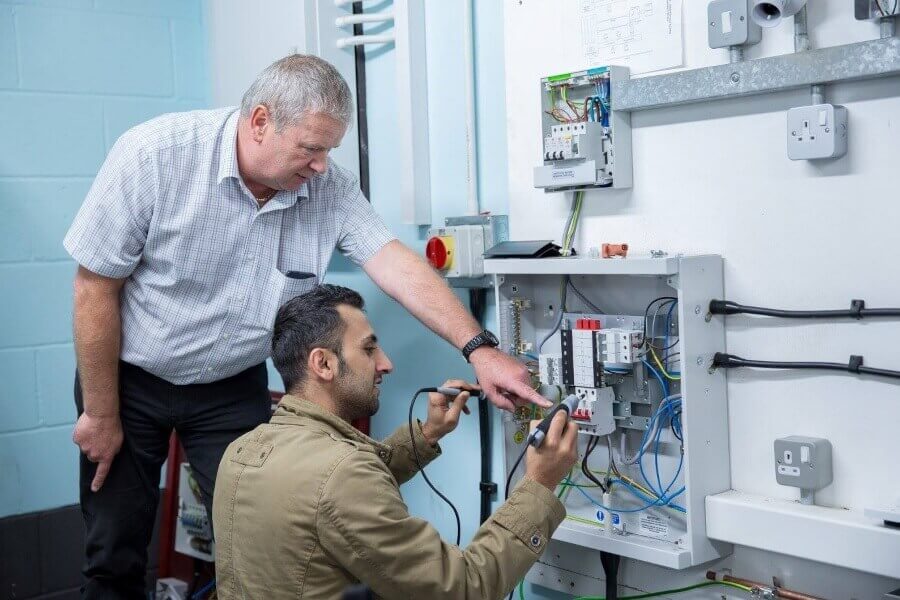How to Become a Professional Electrician Course: Master Skills
Have you ever wondered what it takes to become a professional electrician? Imagine the thrill of powering up a new home, fixing complex issues, or bringing light to dark places.
If you’re interested in a career that combines hands-on work with problem-solving, becoming an electrician might be your perfect fit. But how do you start? And what courses can help you get there? In this guide, you’ll discover exactly how to navigate the path to becoming a professional electrician.
We’ll dive into the courses you need, the skills you’ll learn, and why this career could be more fulfilling than you ever imagined. Stick with us, and you’ll find out how to transform your interest into a rewarding profession.

Path To Becoming A Professional Electrician
Start a rewarding journey with a course designed to teach essential skills for becoming a professional electrician. Gain hands-on experience and theoretical knowledge to succeed in electrical installations and repairs. Equip yourself with expertise that opens doors to a fulfilling career in the electrical industry.
Embarking on the path to becoming a professional electrician is an exciting journey filled with opportunities to learn, grow, and build a rewarding career. Whether you’re drawn to the challenge of solving electrical puzzles or the satisfaction of powering up a new project, this field offers a hands-on experience like no other. But how do you get from curious novice to skilled professional? Let’s break it down step by step.
Educational Requirements
First, you’ll need a solid educational foundation. High school courses in math and science are essential. They prepare you for the technical aspects of electrical work. Consider enrolling in a vocational school or community college program. These institutions offer courses specifically tailored to aspiring electricians, covering topics like circuitry, safety, and electrical codes.
Apprenticeship Opportunities
Education is just the beginning. Real-world experience is crucial. Apprenticeships provide the perfect platform. You learn directly from seasoned professionals, gaining skills that textbooks can’t teach. Picture yourself working on actual projects while earning a wage. This hands-on training typically lasts four to five years and is invaluable for your career.
Licensing And Certification
Once you’ve completed your apprenticeship, it’s time to get licensed. Licensing ensures you meet the industry standards and understand the safety protocols necessary for the job. The requirements vary by state, so check your local regulations. Certification from recognized organizations can boost your credibility and open more doors. Wouldn’t it be great to have potential clients trust your expertise right from the start? Each step on this path is a building block toward your future success as a professional electrician. Are you ready to switch on your career?
Essential Skills For Electricians
The professional electrician course equips learners with essential skills. Gain expertise in wiring, circuit analysis, and safety protocols. Enhance problem-solving abilities to diagnose electrical issues effectively.
Becoming a professional electrician is more than just understanding wires and circuits. It requires a unique blend of skills that ensure safety and efficiency in every project you undertake. These skills are not only essential for your success but also crucial for building trust with your clients. Let’s dive into the essential skills you need to master on your journey to becoming a professional electrician.
Technical Expertise
Technical expertise is the cornerstone of your electrician career. You need to understand electrical systems, wiring diagrams, and the latest technology in the field. A solid grasp of these elements ensures you can tackle any task with confidence. Learning doesn’t stop with your initial training. Stay updated with industry standards and new tools. Regularly attending workshops or online courses can keep your knowledge fresh and relevant.
Problem-solving Abilities
Every job site presents its own set of challenges. Strong problem-solving abilities are crucial to finding effective solutions quickly. Whether it’s a faulty circuit or an unexpected issue, your ability to think on your feet will set you apart. Consider this: you’re called to fix a light switch, but discover a deeper wiring issue. Your quick thinking and methodical approach can solve the problem efficiently. This not only saves time but also cements your reputation as a reliable professional.
Attention To Detail
In the world of electricity, details matter. A minor oversight can lead to significant problems. Your attention to detail ensures safety and functionality in every project. Double-checking your work is non-negotiable. Whether it’s ensuring connections are secure or confirming circuit compatibility, meticulousness is key. Clients will appreciate your precision, leading to repeat business and referrals.
Physical Dexterity
Electricians often work in tight spaces, requiring good physical dexterity. You’ll need to maneuver through attics, basements, or even crawl spaces to get the job done. Your ability to work comfortably in various positions is essential. Consider exercises that improve your flexibility and strength. This not only makes your job easier but also reduces the risk of injury. Physical fitness is an investment in your long-term career success. Think about how these skills align with your strengths. Which areas do you excel in, and where do you need improvement? Mastering these essential skills will not only enhance your capabilities but also ensure a rewarding career as a professional electrician.
Training Programs And Courses
Embarking on the journey to become a professional electrician is both exciting and demanding. The right training programs and courses can significantly influence your career trajectory. From foundational skills to specialized expertise, the choices you make in your education will shape your future in the electrical field. Let’s dive into the crucial aspects of choosing the right training program.
Choosing The Right Program
Finding the right program is akin to laying a solid foundation for your electrical career. Consider the program’s reputation and the qualifications of its instructors. A program backed by industry experts can offer invaluable insights. Look for courses that align with your career goals. Are you interested in residential wiring or commercial projects? Choose a program that offers the specialization you desire. Remember, the quality of your education will impact your confidence and competence.
Online Vs In-person Learning
Online learning offers flexibility, allowing you to balance studies with other commitments. But does it provide the hands-on experience that is crucial for electricians? In-person learning offers direct interaction with instructors and peers, fostering a collaborative learning environment. Consider your learning style and life circumstances. Would a hybrid model suit you better? Weigh the pros and cons carefully before deciding.
Specialized Courses And Workshops
Specialized courses can elevate your skill set, making you stand out in the industry. Workshops offer practical knowledge and networking opportunities. Think about areas where you can add value. Are sustainable energy solutions your passion? Or perhaps smart home technology? Engaging in specialized training can enhance your expertise and open new career paths. These courses can be a strategic investment in your professional growth.
As you weigh these options, consider what truly excites you about the field. How do you envision your future as an electrician? Your choices now can set the stage for a fulfilling career ahead.
Tools And Equipment Knowledge
Understanding tools and equipment is vital for aspiring electricians. Mastery in this area ensures quality work and enhances efficiency. Whether you’re starting out or advancing, knowing the right tools makes a huge difference. This knowledge also promotes safety, which is crucial in electrical work.
Basic Tools For Beginners
Beginners need a few essential tools. A reliable multimeter is crucial for measuring voltage and current. Wire strippers help remove insulation from wires. Pliers are useful for gripping and cutting. A screwdriver set is necessary for various screws. Tape measure assists in precise measurements. These tools form the backbone of an electrician’s toolkit.
Advanced Tools For Professionals
Professionals use advanced tools for complex tasks. Oscilloscopes analyze electrical signals. Thermal imaging cameras detect heat patterns in circuits. Advanced drill sets allow for precise holes in tough materials. Fusion splicers are essential for fiber optic cables. Professionals require these tools for high-level projects and precision work.
Safety Gear And Precautions
Safety gear is essential for all electricians. Insulated gloves protect against electric shocks. Safety goggles shield eyes from debris. Hard hats prevent head injuries. Steel-toed boots provide foot protection. Following safety precautions reduces risks on the job. Always ensure gear is in good condition. Proper use is vital for safety.
Gaining Practical Experience
Aspiring electricians benefit from hands-on training to hone their skills. Practical courses help students understand wiring, circuits, and safety protocols. Learning through real-world scenarios prepares individuals for successful careers in the electrical field.
Gaining practical experience is crucial to becoming a professional electrician. Hands-on training enhances your skills and builds your confidence. It bridges the gap between theory and real-world application. Below, explore how practical experience can shape your career.
Internships And On-the-job Training
Internships offer valuable insights into the daily work of electricians. They provide real-world experience under professional guidance. This practical exposure helps you understand complex tasks better. On-the-job training is another vital aspect. It allows you to work and learn simultaneously. You gain firsthand experience in problem-solving and technical skills. Both opportunities help you grow as a competent electrician.
Networking With Experienced Electricians
Networking opens doors to learning and growth. Connect with seasoned electricians to gain wisdom and advice. Attend workshops and industry events to meet professionals. These connections can lead to mentorship opportunities. Learning from experienced electricians enriches your knowledge. It helps you understand industry trends and best practices.
Building A Strong Portfolio
A strong portfolio showcases your skills and achievements. Document your projects and the tasks you’ve completed. Include photos and descriptions of your work. This visual record demonstrates your capabilities to potential employers. A well-crafted portfolio sets you apart in the job market. It reflects your dedication and professionalism.

Career Advancement Opportunities
Embarking on a journey to become a professional electrician opens a world of career advancement opportunities. As you gain experience and hone your skills, you can explore various paths that elevate your career to new heights. Whether you choose to specialize, continue your education, or start your own business, the possibilities are vast and exciting.
Specialization Fields
Diversifying your skills is one of the most effective ways to advance your career as an electrician. Specialization allows you to focus on specific areas of electrical work, such as renewable energy, industrial systems, or home automation. Each field offers unique challenges and rewards.
Imagine becoming an expert in solar panel installations. As green energy demand rises, your expertise becomes highly sought after. You’ll find yourself working on cutting-edge projects, contributing to a sustainable future, and earning a competitive salary.
Take time to explore different specialization fields. Consider what excites you and aligns with your career goals. Your choice can shape your journey and open doors to new opportunities.
Continuing Education
The electrical industry constantly evolves with new technologies and regulations. Staying updated is crucial for career growth. Continuing education helps you keep pace and enhances your skills.
Enroll in courses that focus on the latest industry trends and techniques. These can range from advanced circuitry to smart home technologies. Each course you complete adds to your expertise and makes you more valuable to employers.
Remember, education doesn’t stop at certification. View it as a lifelong journey that propels you forward and boosts your confidence. What new skills could make you indispensable in the workplace?
Entrepreneurial Pathways
Have you ever dreamed of being your own boss? As a professional electrician, you have the opportunity to start your own business. Entrepreneurship allows you to create your own path and build something meaningful.
Begin by gathering experience and building a network. Your reputation and relationships are key assets when starting out. Consider offering unique services that set you apart from competitors.
Running your own business requires dedication, but the rewards can be tremendous. You control your schedule, clientele, and growth. Could this be the career advancement opportunity you’ve been waiting for?
Staying Updated With Industry Trends
Staying updated with industry trends is crucial for aspiring electricians. The field evolves rapidly, presenting new technologies and practices. To excel, electricians must keep pace with these changes. This ensures their skills remain relevant and sought after. Let’s explore key areas where staying informed can make a significant difference.
Latest Technological Advancements
Technology shapes the electrical industry. Smart home devices are becoming common. Electricians should understand how to install and maintain them. New tools improve efficiency and safety. Familiarity with these tools is essential. Training courses often include modules on these advancements. This helps electricians stay competitive in the job market.
Regulatory Changes
Regulations change frequently. Electricians must comply with safety standards. New laws may impact wiring practices. Staying informed about these changes is vital. Training programs often cover recent regulatory updates. This knowledge ensures compliance and safety on the job. It also builds trust with clients and employers.
Sustainable Practices
Sustainability is gaining importance in the industry. Electricians need to adopt eco-friendly practices. Renewable energy solutions are becoming popular. Understanding solar panel installation is valuable. Training courses often include sustainable methods. This knowledge can open new opportunities in green projects. It also contributes to environmental conservation efforts.
Frequently Asked Questions
What Qualifications Are Needed To Be An Electrician?
To become a professional electrician, you need a high school diploma or equivalent. Most electricians complete an apprenticeship program, which combines classroom instruction with hands-on training. Additionally, obtaining a state license is crucial. Different regions have varying requirements, so it’s essential to check local regulations for specific qualifications.
How Long Is Electrician Training?
Electrician training typically lasts four to five years. This duration includes both classroom education and practical apprenticeship experience. Some programs may offer accelerated paths. It’s important to complete all required training hours and pass necessary examinations to qualify for a professional electrician license.
Are Online Electrician Courses Effective?
Online electrician courses can be effective for theoretical learning. They provide flexibility and access to a wide range of resources. However, practical skills are best learned through hands-on training. Combining online courses with an apprenticeship ensures comprehensive learning and preparation for a professional career.
What Skills Do Electricians Need?
Electricians need strong problem-solving and critical thinking skills. They must understand electrical systems and safety protocols. Good manual dexterity and physical stamina are essential. Effective communication skills help in understanding client needs and collaborating with other professionals. Continuous learning is vital to keep up with technological advancements.
Conclusion
Becoming a professional electrician offers many opportunities. Start with the right course. This journey needs dedication and practice. Hands-on experience is crucial. Seek guidance from skilled mentors. Build a strong foundation with essential skills. Safety should always be your top priority.
Stay updated with the latest technologies. Networking can help you find job opportunities. Keep learning throughout your career. The path may be challenging, but it’s rewarding. Remember, every expert was once a beginner. Take the first step today. Your future as an electrician awaits!





